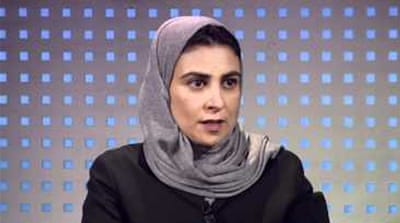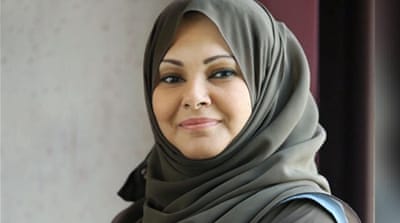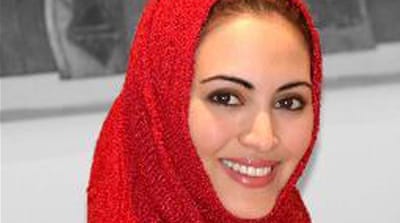Es tut sich was im Staate Saudi Arabiens in Sachen Frauenrechte. Anlässlich der ersten Wahlen im Dezember 2015, bei denen Frauen sowohl wählen wie auch kandidieren dürfen hier eine Auswahl von drei Artikeln, die ich so übernommen habe. -
Something is happening in the state of Saudi Arabia in terms of women's rights. On the occasion of the first elections in December 2015, in which women are allowed to both vote and stand, here is a selection of three articles, two in German (Spiegel 2013 about Domestic violence and the No Abuse campaign, Zeit Dec 2015 about the elections, Al Jazeera Dec 2015 about the elections. -
No Abuse Campaign Photo
Hier ein Spiegel Artikel aus dem Jahr 2013
Frauenrechte in Saudi-Arabien "Nicht alles kann verhüllt werden"


Junge Frauen flanieren auf einer beliebten Einkaufsstraße in Saudi-Arabiens Hauptstadt Riad. ©dpa - Oliver Weiken
Im Königreich wird über Gemeinderäte abgestimmt. Erstmals stehen Frauen zur Wahl und dürfen abstimmen. Von Gleichberechtigung ist das Land dennoch weit entfernt.
Zum ersten Mal in der Geschichte Saudi-Arabiens dürfen Frauen an Wahlen teilnehmen. Am Morgen begann in dem islamisch-konservativen Königreich die Abstimmung über die Zusammensetzung der Gemeinderäte im Land. Unter den mehr als 6.900 Kandidaten sind nach offiziellen Angaben rund 980 Frauen. Etwa 1,5 Millionen Saudis haben sich als Wähler registrieren lassen, darunter 130.000 Frauen. Wegen der strengen Trennung der Geschlechter müssen Frauen und Männer in unterschiedlichen Wahllokalen abstimmen.
Die Gemeinderäte sind die
einzige politische Vertretung in dem Königreich,
die die Bürger in Wahlen zu zwei Dritteln selbst bestimmen können. Das
letzte Drittel ernennt die Regierung. Saudische Männer konnten sie
in den vergangenen Jahrzehnten nur drei Mal wählen. Die Räte sind vor
allem für Dinge wie Straßenbau, öffentliche Anlagen und Müllabfuhren
zuständig.
"Nun haben Frauen eine Stimme", sagte die Wählerin Awatef Marsuk in der Hauptstadt Riad. "Ich habe geweint. Es ist etwas, das wir sonst nur im Fernsehen in anderen Ländern gesehen haben." Allerdings sagte Marsuk, sie habe einen Mann gewählt. Der habe gute Ideen für Kindergärten gehabt. Viele der verschleierten Frauen wurden von ihren Ehemännern, Vätern oder Brüdern zu den Wahllokalen gefahren, da sie nicht selber Autofahren dürfen.
Mohammed al-Schammari, der seine Tochter mit dem Auto brachte, sagte, er habe sie ermutigt zu wählen. "Wir wollen diese Barriere durchbrechen", sagte al-Schammari. "Solange sie ihren eigenen Platz kennt und es keine Durchmischung mit Männern gibt, warum sie vom Wählen abhalten? Wir unterstützen alles, das nicht gegen die Scharia verstößt", sagte er mit Bezug auf die islamische Rechtsordnung.
Wegen der strengen Geschlechtertrennung durften Kandidatinnen im Wahlkampf nur Frauen treffen. Viele setzten daher auf Werbung im Internet. Zudem war Frauen die Registrierung für die Wahl dadurch erschwert, dass sie selbst nicht Auto fahren dürfen. Wegen der Einschränkungen gilt es als unwahrscheinlich, dass eine Frau tatsächlich einen Sitz in einem der Gemeinderäte erhält. Die Kandidatin Amal Badreldin al-Sawari sagte: "Um Ihnen die Wahrheit zu sagen, ich trete nicht an, um zu gewinnen. Ich denke, ich gewinne, indem ich antrete."
Trotzdem werden Frauen weiterhin diskriminiert
Menschenrechtler begrüßten die
Abstimmung als Fortschritt für die Frauenrechte. In den vergangenen Jahren hatten Frauen zudem Freiheiten im Bereich der
Bildung und im Berufsleben bekommen. "Saudi-Arabien hat
erkannt, dass es sich in Sachen Frauenrechte weiterentwickeln muss",
erklärte Adam Coogle von Human Rights Watch.
Zudem kritisierten radikale Theologen das Frauenwahlrecht, das König Abdullah auf den Weg gebracht und der derzeitige König Salman trotz Protesten unverändert gelassen hatte. Laut der Frankfurter Allgemeinen Zeitung habe sich Scheich Abdurrahman bin Nasir al-Barrak zur heutigen Wahl geäußert. In einer Fatwa habe er verboten, Kandidatinnen zu Wahlen zuzulassen, diese zu wählen und danach Frauen in ein öffentliches Amt zu berufen. Der Scheich habe bereits 2010 allen mit dem Tod gedroht, die die Gleichberechtigung der Geschlechter befürworten.-
Verschleierte Frauen in Mekka 2011 , photo:Hassan Ammar/AP
Here the article from Al Jazeera concerning the elections in Saudi Arabia
For the first time in Saudi Arabia, women are allowed to run as candidates and cast their votes in local elections.
The municipal polls will open at 8am on Saturday and close at 5pm, local time (5am-2pm GMT).
Two-thirds of seats at the kingdom’s 284 councils are up for grabs, with more than 1,000 female candidates in the running, compared with more than 6,000 men.
Some 100,000 women have registered to vote, meanwhile, compared with more than 400,000 men.
First results are expected towards the end of the day. Final results will come a month later as the process allows for the electorate to raise objections in that period.
Speaking to Al Jazeera on Friday hours before polls opened, several women said they felt excited and positive that women are participating, with the hope that society as a whole would benefit from more diversity in public affairs leadership.
Here are some of their views:
| Lama Al-Sulaiman, candidate in Jeddah |
Of course we’re excited; it’s the first time we’re participating. If I win, I’m going to be happy and then I’m going to continue my work. For 10 years, I’ve worked on women’s issues and employment, so when this opportunity came along and I had the experience, I thought, why not? I don’t think it [women’s involvement] will change things, but it’s another push forward. It’s a wheel that has been rolling and this is another achievement, a kind of progression.
Women here are doctors and engineers – it’s not like women aren’t there. The international media sometimes has narrow views; they only report the bad stories. We have them, we have weaknesses and every citizen goes through challenges – those shouldn’t be belittled. But to think that 50 percent of the population is going through those challenges is also ridiculous.

When I read some things, it sounds like men don’t allow women to mix with them. But we did a poll recently of 3,000 participants, asking men and women if they want segregation in the workplace. Fifty-two percent said they preferred to work in a segregated environment, 42 percent said they don’t mind as long as there were segregated spaces in the office.
I am a person who is extremely tolerant and I respect the opinion of everyone, including the ultra-conservatives. Pushing people to change their habits takes a long time, it doesn’t happen through shock doctrines or pressure. More women in the workforce is going to reduce their [ultra-conservatives’] fears of the unknown.
More women need to participate, there’s an economic need for that. But I don’t like when we push people into environments they are not used to. I respect the ultra-conservatives. If we win, I hope they work with us. I’ve worked with such people before in the chamber of commerce and it’s been enlightening to have dialogue with them. That’s when fears are reduced, the fighting and aggression declines.
| Manal Faisal al-Sharif, banned candidate in Jeddah |
I think I was banned because people complained that I was using the media to promote my campaign. But I wasn’t. I simply tried to give women information about how to vote, the process. I tried to raise awareness about the vote. I wanted to encourage them to go to the centres with the correct papers. I guess someone got angry and made formal complaints.

In any case, I am still very excited about the elections. I’m proud of my colleagues, neighbours and friends. I’m on WhatsApp groups with women and there is a real sense of solidarity. Some are like training centres for how to go and vote and participate. It’s a big step towards equality.
Tomorrow, I will vote for a female candidate because I believe she has a good programme. She will help the area. But my biggest fear is that no women at all will be elected.
Saudi Arabia does have very conservative segments of society, but we have people in the middle. And I think those that encourage women are in the majority.
Women can effect change, and I think by having women in these positions will build bridges with the people who hold ultra-conservative views.
| Mona abu Suliman, media personality and consultant in Riyadh |
Even if women don’t win tomorrow, just going through this process was really important. Recognising women’s votes in decision making is a step towards equality.

There are people who see women voting and running in the election as another step towards westernisation. They dislike seeing women in public-facing roles. But I don’t think they are in the majority. The majority is either neutral or accepting.
Those who are against it basically fear we will turn out like the United States, with women and men mixing in every aspect of life.
On the whole though, given what’s on Twitter, on TV, what friends say, I think there is a real delight that women are part of this and that women might win.
| Unnamed Riyadh-based candidate |
Of course we’re happy. This inclusion was the wish of [the late] King Abdullah [bin Aziz] and [ruler] King Salman [bin Aziz]. It was their wish to have women in the right place, and it means a lot.
Participation means a lot for both men and women. The achievement of this is that we will be developing what has already been started – we want to our work to reach the people in the community and improve their situation.
I don’t want to say anything about critics. All over the world, there are people for and against things. I don’t want to attack anyone. I want things to be smooth and peaceful.
Diskriminierung von Frauen in Saudi-Arabien

























Keine Kommentare:
Kommentar veröffentlichen